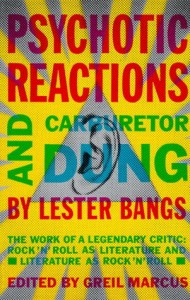For the last week I have been trying to read Psychotic Reactions and Carburetor Dung by Lester Bangs. It is a collection of articles about music that originally ran in the 1970’s. It is one of the worst things I have ever read, and I choose to read scientific reports for a living. As I was working my way through it I kept asking myself, am I just not getting it? What am I missing? Is this like when I read Tess of the D’urbervilles and hated it because I didn’t realize that the main character had gotten raped (which is the basis for the entire story) and then got completely owned in class the day we discussed it??
 I’m still not sure if the articles are actually as awful as I perceive them to be, or if I’m completely missing the point, but I guess I’ll find out in class this week. For short pieces I found them incredibly hard to follow, and as music reviews I would say that most of the time I couldn’t even tell whether or not he liked the album or artist he was talking about. It reads like a ridiculous stream of conscious, that goes off on completely unrelated tangents that in my opinion add very little to the writing. He also uses the longest sentences. A single sentence should not take up a whole paragraph, thats just bad technique. Actually, its the absence of technique, which is really all that Bangs style of writing is.
I’m still not sure if the articles are actually as awful as I perceive them to be, or if I’m completely missing the point, but I guess I’ll find out in class this week. For short pieces I found them incredibly hard to follow, and as music reviews I would say that most of the time I couldn’t even tell whether or not he liked the album or artist he was talking about. It reads like a ridiculous stream of conscious, that goes off on completely unrelated tangents that in my opinion add very little to the writing. He also uses the longest sentences. A single sentence should not take up a whole paragraph, thats just bad technique. Actually, its the absence of technique, which is really all that Bangs style of writing is.
I wish someone would pay me to say whatever I damn well please, but until this blog gets bought and turned into a TV show (which is obviously my life’s back up plan, lol) I’ll have to settle for writing for my audience and employers. If only Bangs had such constraints. His pieces read like sprawling blog posts with no point, but lots of stories and personal opinion. He literally just says whatever he wants.
The only piece in the whole collection that I liked at all was his article on The Clash. I may be jaded because personally I love The Clash, but this article actually made sense. There was a point, which Bangs proved by painting the scene in a literary way. He describes his personal interactions with the band to prove how they are different from all of their peers in the way that they care about their fans. It is an argument that he is able to prove, and he does. It is the only piece in the whole collection with that quality.
In other news, I hate press releases that are misleading and confuse me because I read them when I am half asleep so that I leave messages for potential sources early in the morning that have nothing to do with what I want to write about and don’t realize it until I get ahold of the PI hours later. So tomorrow I get to clean up my mess of messages, so that I can track down sources for an article due next week. Fun times. But there is always Rock the Casbah, and for today I guess that is enough.